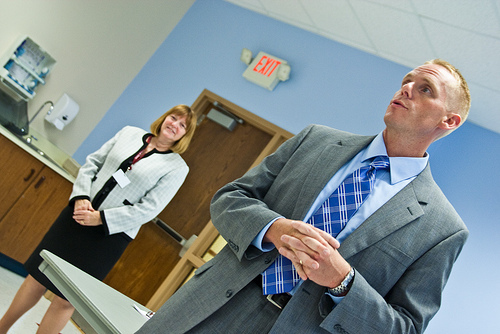Today’s taxpayers are heavily indebted for yesterday’s education through outsized pension promises to teachers and administrators, and a new study finds retired school administrators are hauling home the biggest piles of cash. The national total of unfunded pension liabilities for state and local government retirees is roughly $2 trillion, half of which are K-12 liabilities.
“There is a growing divergence between the private and public sectors, with a number of implications,” said report author Cory Koedel, an economics professor at the University of Missouri-Columbia. “The pension system is sucking money out of education.”
Because administrators earn higher salaries than teachers, and pensions typically depend on salaries, administrator pensions are significantly higher than teacher pensions, found Koedel and coauthors Michael Podgursky and Shawn Ni, also economics professors at UM-Columbia. “The School Administrator Payoff from Teacher Pensions” shows, for example, that Missouri superintendents contribute 53 percent more to their pensions but receive 89 percent more in benefits than career teachers, and 171 percent more than novice teachers.
“By design, [typical education pensions] redistribute wealth from young, mobile teachers to career teachers and senior administrators,” the study says. Public pension structures also push bright young people away from teaching, and induce most educators to retire in their mid-50s, it says.
While educator pensions have increased in recent years, those of private-sector professionals have flatlined.
Disadvantaging Teachers
Many younger teachers want portable retirement benefits, but because this doesn’t benefit the school administrators who decide such policies, the latter generally oppose reform, Koedel said. Currently, most education pensions are defined-benefit, meaning employees are guaranteed a certain amount and taxpayers cover any stock market dips on their behalf.
“We have some really perverse incentives built into the system,” said Sandi Jacobs, state policy director for the National Council on Teacher Quality. “Because of the defined-benefit system, there’s a sweet spot where if you don’t retire you start costing yourself money, whether you’re a superstar teacher or just so-so. We want to figure out how we can get our superstars to stay as long as possible. In the other direction, somewhat who’s not as effective and knows the classroom is not the right place for them anymore, they’re going to hang on to get to that sweet spot.”
Instead of providing equal benefits, the education pension system is heavily backloaded, meaning teachers who move around or are younger get little or no benefits, whereas people who stick in the same system for a long time, as is common among administrators, receive huge financial rewards, Podgursky said.
Recent structural changes to state pensions assume teachers will exit the profession and lose their benefits because of this delayed kick-in, Jacobs said.
In the past year, the number of states requiring educators to work within one school system for ten years before receiving retirement benefits has doubled, which probably keeps people from entering the profession, Jacobs said.
Smart Teachers at Disadvantage
Pension-related financial difficulties for schools still paying retired teachers also means new teachers get smaller salaries, Jacobs said.
Barring teachers from taking their retirement benefits with them to new jobs is yet another barrier to recruiting bright teachers. “Smart, young people move around,” Podgursky said. “Every employer aside from the public education system recognizes this.”
U.S. worker mobility has drastically increased in the past century and most private retirement benefits have adjusted to fit this reality, but state pensions are still stuck in the industrial model, Koedel said.
Podgursky recommended allowing high-quality teachers who have accrued large pension benefits to keep them so they don’t retire early.
Accounting Mess
Teacher salaries roughly equal comparable private-sector salaries, but their pension packages are worth typically one and a half times private-sector benefits, according to a recent American Enterprise Institute study.
Public pensions have suffered both from poor stock market returns and decades of legislatures and districts not paying into them the required amounts because their actuaries promised far higher investment gains than any private pension system, which never materialized.
“Legislators and the policy community almost never get a second opinion,” Podgursky said. “The actuaries are hired by the pension fund and produce the fiscal note and information that the legislators get.… It’s really surprising in public policy.”
No Taxpayer Representation
Taxpayers hire administrators to run schools, Podgursky noted, but “labor and management are on the same side of the bargaining table here. In a private firm, typically managers are not in the same pension plan as private employees. The executives are not part of any defined plan,… so they can represent the stockholders.”
With education pensions, by contrast, the people making financial decisions directly benefit by increasing their spending.
This removes any incentive for school leaders to promote the changes necessary to avoid huge tax liabilities for expensive pension systems, Koedel and Podgursky agreed.
“It does not seem reasonable for us to expect reform to come from inside,” Koedel said. “In a private firm where [supervisors] are disconnected, they ensure that the company moves forward and is efficient later. In this case, the incentives are aligned for that not to happen.”
Some state lawmakers have begun to recognize the pension crisis and its impacts, Podgursky said, but many are still avoiding it.
Learn more:
“The School Administrator Payoff from Teacher Pensions,” Cory Koedel, Shawn Ni, and Michael Podgursky, Education Next, Fall 2013: http://educationnext.org/the-school-administrator-payoff-from-teacher-pensions/
Image by Steven DePolo.




